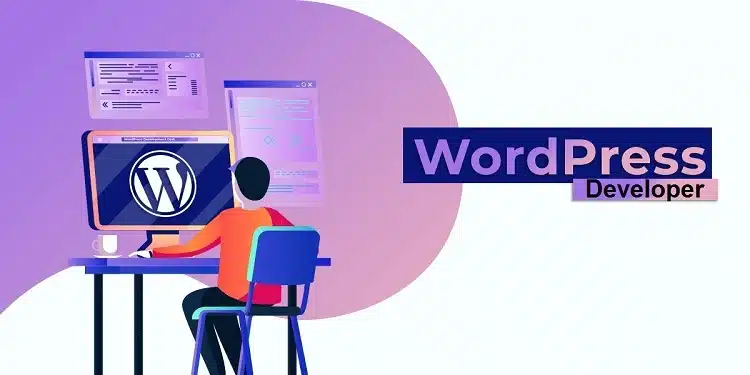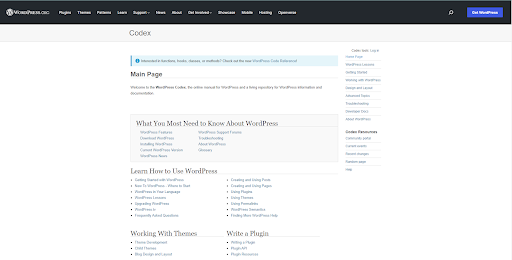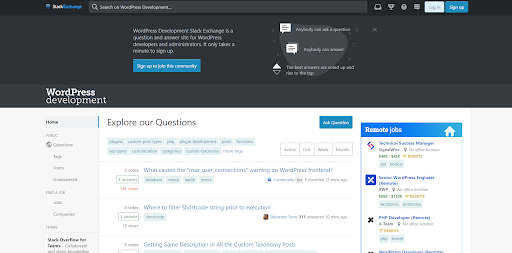Becoming A WordPress Developer: Everything You Should Know

As the number of websites increases, the number of websites built on WordPress also goes up. Site owners prefer WordPress because of its ease of use and customizability.
According to W3Techs, 43.3% of all websites use WordPress as their CMS. Part of the reason why it’s so popular is that you don’t need to be proficient in coding to build a website. You can easily use plugins and customizable themes and configure its settings.
Within the realm of WordPress development, there are diverse specializations, ranging from core development to plugin creation. Whether aspiring to become a core developer like Smith or specializing in plugin development, this comprehensive list will provide invaluable insights into the journey of becoming an expert WordPress developer. If you’re considering diving into WordPress development, so the idea to hire WordPress developers can streamline your process and elevate your projects to new heights.
WordPress’s functionalities are greatly owed to its developers. A WordPress developer is in charge of the infrastructure and ecosystem of the platform.
They manage the frontend and backend development of the WordPress websites by creating WordPress themes and plugins, coding in different languages, and building wireframes or sitemaps.
There are different types of WordPress developers, from core developers to plugin developers. If you want to forge your way into becoming an expert WordPress developer, this list will tell you everything you need to know.
1. Learn coding basics
While it’s true that you don’t need coding skills to build a WordPress website, you will need them if you’re a developer.
You must know basic HTML, CSS, Javascript, and PHP. That is helpful when you need to troubleshoot, debug, or improve the functionality of WordPress.
Different coding languages are needed to accomplish different tasks. For example, in setting up WordPress error logs, you should know how to use PHP. The same goes for creating unique theme designs for a site– coding languages like HTML and CSS are helpful here.
There are plenty of sites that offer coding courses. Some are even for free, like CodeCademy or FreeCodeCamp. Some of these sites even offer other coding languages like Python, Ruby, Angularjs, The Command Line, Node.js, React, jQuery, and more.
2. Tap into online resources
Every CMS is unique, so you must read up on WordPress-specific resources. There are numerous materials online to help you understand what sets WordPress apart and how you can elevate yourself into a skilled developer.

You should start with the official WordPress manual written by its developers. The WordPress Codex covers everything from creating a website to the technical functionalities of the platform. They also compiled an official list of developer resources that you should check out.
There are also other online resources like Envato Tuts+ and Know The Code, which are perfect for more advanced programming.
3. Identify one area to specialize in
Becoming a WordPress developer requires a certain level of technical knowledge, but it doesn’t mean you have to be good in every aspect. Learning a specialization and honing your skills in that specific area can get you far.
There are three common types of WordPress specializations:
Core Software Development – This specialization focuses on the platform itself. It involves creating and editing WordPress’s core code by fixing bugs and collaborating with other developers.
Plugin Development – Plugins are essential for WordPress users as they seamlessly extend the platform’s functionality. Plugins are sometimes released for free or sold in third-party marketplaces or websites.
Theme Development – The best thing about WordPress themes is that they are user-friendly. Theme developers create custom themes for individual clients, sell them on third-party websites, or make them free for use in the WordPress Theme Directory.
These are just some of the areas you can focus on. There are other areas like API that are also becoming highly competitive.
Nearly 90% of developers are using APIs, according to Nordicapis. Choose a focus area that best represents your interests and shows your skills.
4. Join developer forums
Among content management systems, WordPress has the largest community of developers devoted to enhancing the platform for users.
You can get in touch with these members through online support forums and Slack channels. That is particularly helpful when troubleshooting errors and staying updated on product releases and updates.

WordPress has an official support forum where developers can post and answer questions. You can also visit other discussion groups on Quora or Facebook. For more advanced WordPress queries, Stack Exchange is a great network. It has a page specifically for WordPress queries, so finding the answers is easier.
If you want to become a good WordPress developer, growing your network and learning from other developers is the way to go. You can also find email addresses and message fellow developers privately if you wish. You can even use recurring emails to follow up.
5. Begin with practice projects
Once you have learned all the technicalities of WordPress development, it’s time to test out your skills by doing test projects. As a newbie developer, it’s highly encouraged that you volunteer for projects to build up your portfolio.
This portfolio should be able to showcase your skills in the focus area you’ve chosen and increase the chances of being hired by a company or a client.
Your portfolio can be in the form of a website, much like this example from freelancer Phil Owen. Through a minimal design, he presents his portfolio in a single webpage that is easy to navigate. He lists down all the work he did on each project and allows visitors to examine them– something that is very useful in attracting big clients.
Use a variety of projects in your portfolio to showcase your flexibility and style. That said, once you start picking up work and growing your clientele, remember to keep track of everything and charge what you deserve.
6. Update your skills
Honing your skills is a must for any WordPress developer who wants to stay competitive. You should keep yourself updated on the latest technology and trends surrounding your focus area by immersing yourself in books, online courses, tutorials, and articles. Even college degrees like computer science can help certify your skills as a developer.
One of the most competitive WordPress trends is the use of A.I. technology, with tools like an AI coding agent helping developers streamline tasks and improve efficiency. A survey by MindTree found that 77% of organizations have already implemented some form of A.I. technology. Other trends include the use of multipurpose themes and chatbots.
Besides technical skills, you should also improve soft skills like communicating with clients and marketing your services. That will help you attract and retain more clients, which can, in turn, keep the stream of income moving.
Wrapping up
Working as a WordPress developer can be challenging at first, but it can be a fulfilling and lucrative career once you get the hang of it. Since it is one of the most used CMS, there is no shortage of potential clients.
As the foundation of a good WordPress developer, knowing various coding languages can help you tremendously. Of course, you will need a focus area to specialize in. Take your pick from core development, plugin development, or theme development.
You can learn all these languages and focus areas by joining online forums and utilizing informational resources.
Lastly, build your portfolio by engaging in test projects.
Don’t forget to improve your skills continually to stay competitive. Follow all these tips, and you’ll see your value going up and your profit increasing.
Good luck!
Nico Author
Nico is the founder of Crunch Marketing. The company works with enterprise SaaS clients, helping them scale lead generation globally across EMEA, APAC, and other regions.




